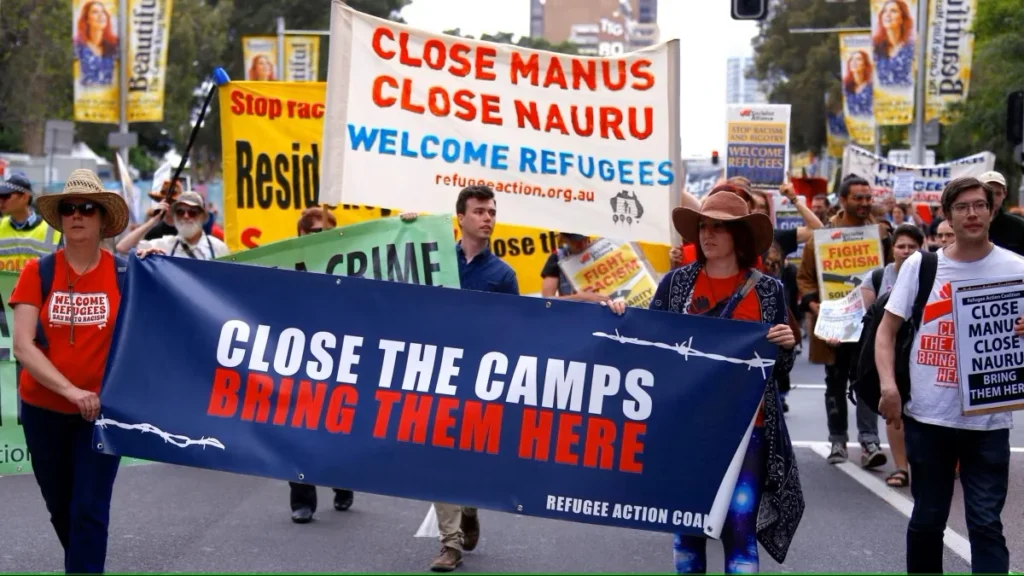Introduction
Australian Voters Support Humane Refugee Policies as a recent survey highlights a significant public sentiment toward fairness and compassion in refugee policies. Conducted by Redbridge and commissioned by the Asylum Seeker Resource Centre (ASRC), the poll reveals that a majority of Australians expect their government to uphold a humane approach to asylum seekers.
Public Support for Asylum Seekers’ Rights
Findings from the survey, which polled 1,508 Australian voters in January, indicate strong public backing for extending rights to asylum seekers. Over half of respondents support granting work and study rights to individuals awaiting visa decisions. This aligns with broader public expectations for policies rooted in humanity rather than punitive measures.
Despite this widespread support, the survey also reveals a complex public stance on asylum policies. While many favor compassionate measures, a segment of the population still backs tougher restrictions. The divide is influenced by factors such as political affiliation, media exposure, and broader concerns about border security.
Asylum Seekers and Election Priorities
Interestingly, refugee issues rank low among voter concerns in the lead-up to the federal election. The top three priorities for voters are:
- Cost of living
- Healthcare
- The economy
Only 1% of respondents identified asylum seeker policies as their primary election issue. This suggests that while many Australians value humane treatment of refugees, other national concerns take precedence in shaping voting behavior.
Even though refugee policy is not a top voting issue, the moral and ethical dimensions still resonate strongly with the public. Many Australians view the treatment of asylum seekers as a reflection of national values, and there is growing concern about how international allies perceive Australia’s stance on humanitarian matters.
Mixed Views on Offshore Detention and Deportation
The government’s practice of offshore detention and deportation remains divisive. Key survey findings include:
- 35% support paying other countries to accept asylum seekers or non-citizens facing deportation.
- 32% oppose such measures, while 23% remain neutral.
- Almost a third favor deporting asylum seekers to their home countries, regardless of safety concerns, while 42% oppose it.
- Over two-thirds support reassessing cases denied under the previous government’s fast-track system.
Many Australians struggle to reconcile security concerns with human rights considerations. Some believe offshore detention is necessary to maintain strong borders, while others argue it contradicts Australia’s commitment to protecting vulnerable populations.
Additionally, the cost of offshore detention programs has drawn criticism. Reports indicate that maintaining detention facilities in locations such as Nauru incurs substantial expenses, raising questions about the financial sustainability of such policies.
Political Messaging and Public Perception

To assess how messaging influences opinions, survey participants were divided into groups exposed to different narratives on offshore detention. The results demonstrate how political framing can sway public sentiment:
- Support for offshore detention dropped from 51% to 49% when respondents were exposed to messaging against the practice.
- Conversely, pro-offshore detention messaging increased support to 57%.
These findings underscore the impact of political discourse in shaping refugee policy opinions. The survey also found that conservative-leaning voters and those who consume right-leaning media tend to support stricter asylum policies, while progressive-leaning voters are more likely to favor granting rights to asylum seekers.
Public Expectations from Political Leaders
Jana Favero, Deputy Chief Executive of ASRC, emphasized that public sentiment leans towards compassion. She highlighted that political leaders should recognize voters’ desire for policies prioritizing humanity over punishment.
Redbridge Director Kos Samaras echoed this, cautioning against politicizing refugee policies for electoral gain. He stressed that Australians expect a fair and humane approach rather than policies designed to punish marginalized communities.
Moreover, international human rights organizations have urged Australia to reconsider certain policies, citing concerns over prolonged detention, inadequate living conditions, and mental health issues among detainees. Experts warn that failure to address these humanitarian issues could damage Australia’s reputation on the global stage.
Conclusion
The survey results paint a nuanced picture of Australia’s attitude toward refugee policies. While the majority advocate for fairness and basic rights for asylum seekers, opinions remain split on offshore detention and deportation practices. Political leaders are urged to align policies with public expectations—grounding decisions in humanity rather than harsh enforcement measures.
As the federal election approaches, will political parties heed this message? Voters are watching, and compassionate policies may shape future electoral outcomes. Political candidates who align with public sentiment on humane refugee treatment may find increased voter engagement and broader support among moderate and progressive demographics.
In the coming months, the debate over asylum policies is expected to intensify. The question remains: Will leaders prioritize ethical governance, or will short-term political gains dictate the national approach to refugees?


